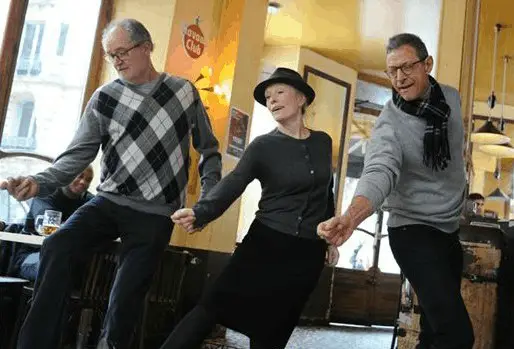Le Week-end is a comedy, drama, romance, but not a rom-com — unlike the bulk of romantic/comedy blends this is about a couple on their 30th wedding anniversary, attempting to fall in love with each other again. The promotional material shows the characters laughing, but this is not representative of the mood, which is heavy. The humour is dark. If you’re familiar with the work of Hanif Kureishi, well, that’s who wrote it. No surprises re the darkness.
This film bears resemblances to Date Night (2010) — an unusual blend of comedy, crime and romance. This film, too, might have been ‘crime’ had the emphasis been slightly different. In order to bond, our old couple engages in petty thievery (doing a runner from a high-class restaurant) and then by maxing out their credit card on the most expensive suite in a fancy hotel. They walk out on that, too, and eventually they are forced to call on Morgan to bail them out of that mess. Judging by IMDb, neither Date Night nor Le Week-end have particularly broad appeal. This type of story must be especially hard to do.
This story is, however, a mythic journey. The journey underpins the structure. Even if the audience feels uncomfortable in the company of these characters, it is a very well structured film.
STORYWORLD OF LE WEEK-END
The setting of Paris is ironic and highlights out all the shortcomings in the characters, because if cities have their own symbolism, Paris is the city of love. If you’re failing at a romantic weekend, it’ll be all the worse if you’re failing in Paris. Micro settings within Paris itself area also symbolic, from the beige coffin of a room to the ridiculously luxurious room they choose next (a symbol of a life which is actually quite comfortable) to the graveyard they walk through to the jukebox cafe where they dance.
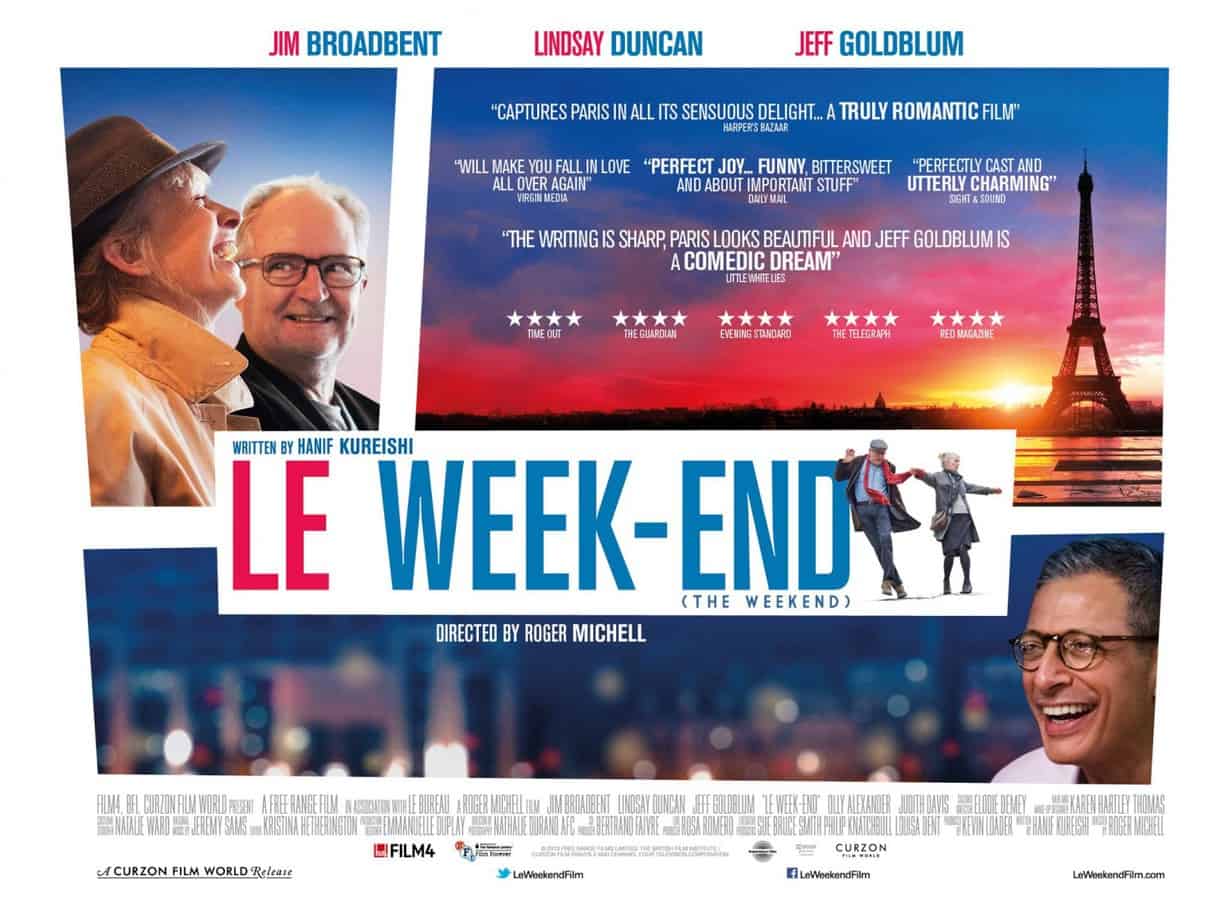
DESIRE IN LE WEEK-END
We first meet them on the TGV. At this point they are nameless. The camera guides us down the aisle and settles upon this couple as if we, too, are a passenger on the train looking on. We know immediately that this is an long married couple because they sit side-by-side, she with a novel (The Elegance of the Hedgehog), he looking out the window. He wants to buy a cup of tea. The wife knows this before we do — she knows that’s what he must be up to after many years of travelling together. “You’ve got the Euros,” she says, annoyed. After this many years together they have divvied up the jobs — I suspect Nick always carries the Euros.
We see that this couple is on their way from England to France for a holiday. It’s enough for them to want to ‘have a good holiday’, but far more interesting that there is another overwhelming desire: to rekindle a marriage in trouble.
If this is a comedy (and it is), we know these two will fall in love with each other again. If they left Paris separately it would be a tragedy.
PSYCHOLOGICAL NEEDS, MORAL WEAKNESSES IN LE WEEK-END
Once in France it is revealed that they have been here before when much younger and happier and in love.
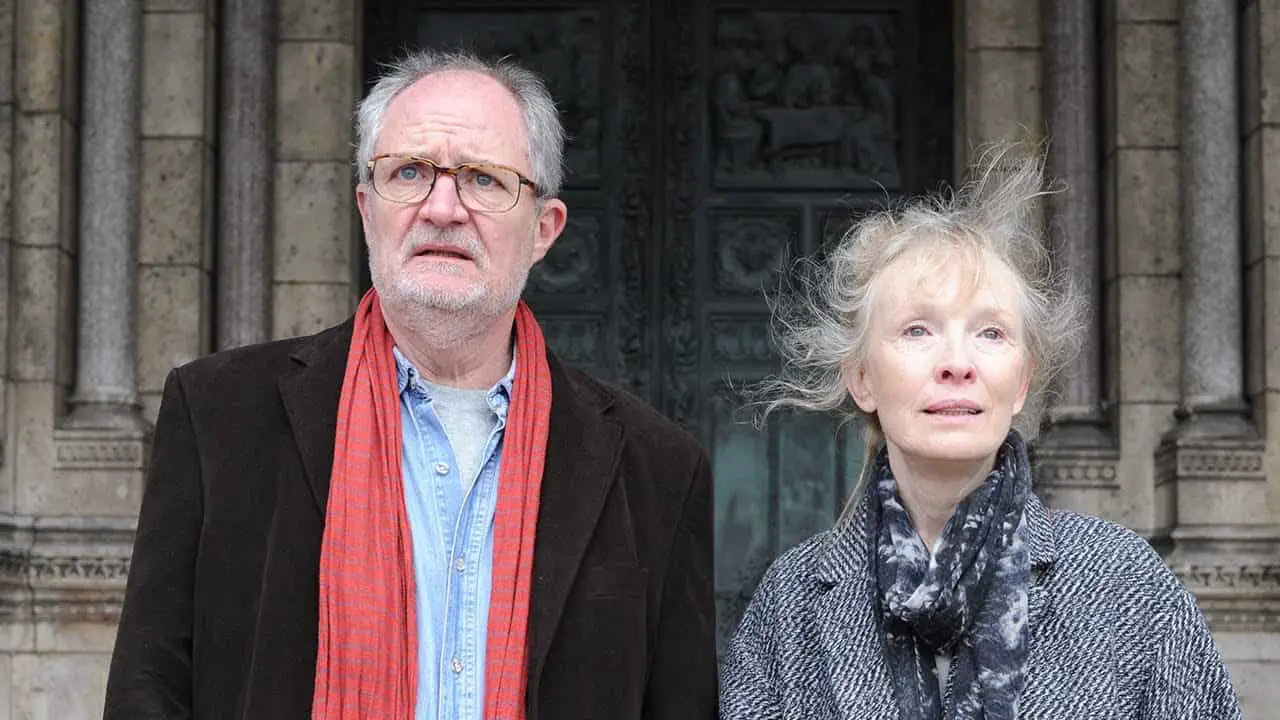
Le Week-end makes us wait. First, we are shown a number of sequences and almost asked to pick sides. I suspect the audience is expected to side with the Jim Broadbent character (whose big, blue eyes and old-man vulnerability lend themselves well to audience empathy). His wife is complaining about everything. She not only complains about the room he has picked, even though he is trying to recreate a holiday they had here when younger, but storms out, seemingly happy to leave him behind. This after he tries to explain in bad French why his wife doesn’t like the room. He is doing is utmost to placate her. She leaves the building. We watch him thump on the roof of the taxi before it takes off. We watch him try to rekindle physical passion. She pushes him and he falls onto the road, hurting his knee. She tells him to grow up, to stop being a girl, to be a man. To make her seem even worse, they get a call from their son who is going through some sort of crisis. The wife has guessed that he wants to move back in with them. It seems they’re being kicked out. He has a wife and they have a three month old baby. The husband entreats his wife with, “We can’t abandon our son.”
This dynamic feels familiar — that need for a man to placate his woman, trying but failing miserably. The wife with simmering rage. I imagine many viewers will be completely put off by this woman from the outset, but older women, I predict, will know that there is a very good reason for this rage. There is a short story by Alice Munro, Away From Her, which explores a very similar dynamic. That, too, was made into a movie. The increasingly demented wife seems very cold and the husband seems very caring and sad as he transitions her into an old people’s home. Why is this? Is it just the Alzheimers? It comes out later, after we’ve seen the wife take up another relationship with another man with Alzheimer’s that this husband (also a university lecturer) has in the past had affairs with students. Finally we get some of the wife’s story. We’re not in her head — we are asked to imagine what she’s had to endure.
Naturally, Le Week-end cannot be made up entirely of passive-aggressive rage. The audience cannot spend 93 minutes with this old-married couple who seems to hate each other, especially when one is painted so pathetically and the other so callous. The writers get us through this by giving us emotional whiplash — these brutal interactions are followed by moments of genuine affection. Anyone who’s ever known a long-married couple, anyone who’s ever been a long-term couple, will understand the feeling of being fully in love with someone but not wanting to be anywhere near them.
It seems at first glance that Nick’s psychological need is that he is too much of a push-over. Too willing to please his unreasonable wife.
It seems Meg is completely unappreciative. Moral shortcoming: She needs to learn to appreciate her husband. Psychological shortcoming: She is suffering from middle-aged ‘blah’ (symbolised by the ‘beige, coffin’ of a room she refuses to stay in, and needs to find a new lease on life to remind herself she’s not dead yet.
On a couple of occasions the couple walks up hills/stairs. They contrast their panting (deliberately cut to sound sexual) against the ease at which their younger selves climbed these same steps. Steps are, of course, an obvious metaphor for life itself.
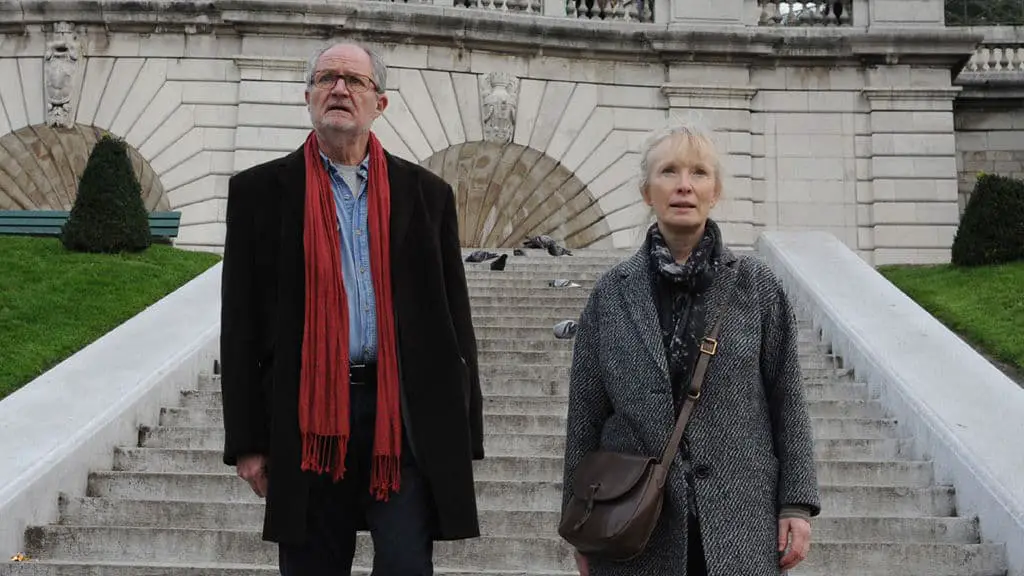
Those are the surface shortcomings, but because this film is basically a character study, their psychological shortcomings and needs are more complex than this.
DIALOGUE IN LE WEEK-END
It is interesting, given that we’ve been adequately shown, that the dialogue underscores us everything about this emotion.
“You can’t not love and hate the same person. Usually within the space of five minutes, in my experience.”
— Nick
Conveniently, since there are only two speaking characters for the opening act of the film, these are self-aware characters. They are also articulate — it is revealed later that Nick Burrows is a lecturer in philosophy. He is an artist, a musician, and this sort of character can sustainably withstand this kind of reflective dialogue. Contrast with the teenaged characters of Australian aboriginal film Samson and Delilah, whose writer/director went out of his way to avoid the falsely self-aware dialogue given to fictional teenagers — teenagers who haven’t got the first clue about who they are, or how to describe what they’re feeling.
PLANS IN LE WEEK-END
Nick’s original plan to take his wife back to earlier happier times in France don’t pan out when he either fails to remember the exact location or the place isn’t as they remembered (viewed through the lens of more cynical eyes), or the renovations have rendered the place unrecognisable. A masterful thing about Kureishi’s writing is that any and all of these things could be true, and they all say something deeper about the characters.
So they throw away the holiday plans and Meg decides to let down her hair, with not a care to finances. They will stay at the most expensive hotel in Paris and drink everything out of the fridge.
Holiday plans are interspersed with talk about their larger, life goals. The graveyard setting as they stroll along, talking about the rest of their lives, is of course another ironic touch.
We learn that Meg does not want to be an HOD high school teacher anymore. She doesn’t want Nick in her life. She doesn’t want her layabout son in her house. She doesn’t want another man. She only knows what she does not want.
We learn that Nick wants things to go along as they always had, but that is no longer possible because he is being forced out of his job. He has thoughts of being an artist. Once so full of promise, he considers himself to have lead an entirely hum-drum life.
With this weekend as a microcosm of their wider life, they have no solid plans for Paris. Plans are made for them when Morgan invites them to his dinner party.
CHARACTER WEB IN LE WEEK-END
The writers needed this couple to meet some other characters. Road journeys are hard (holidays are a type of road trip, for narrative purposes). They tend to feel fragmented because the main characters go from place to place and they’re always coming up against completely new allies and opponents, and the writers is going to have to manufacture some big struggles, because the big struggles the main characters are having between themselves are going to feel real old real quick.
That’s why Morgan comes in. A chance encounter with an old friend of Nick’s — an American, to contrast against Nick’s utter Englishness. Jeff Goldblum ‘plays’ the American very well (of course, it probably helps that he is American). In contrast to the reserved main characters from Moseley, Morgan is effusive and touchy-feely and upfront. He wastes no time telling the pair he has moved on to his second wife, who he is also effusive about.
Morgan is the character Nick could have been… were Nick not Nick. Nick, too, could have left his wife. He could have moved to Paris, as indeed, he suggests whimsically to Meg at one point as she admires the view from their hotel balcony. Later in the story, Morgan not only proves to be Nick’s ‘could-have-been’ character but is also his ally, who lets Nick in on an uncomfortable truth. The audience has already deduced this about Nick — this is one of his main shortcomings — he is ridiculously comfortable in life and doesn’t know it. Meg is no better — she laughs (perhaps scornfully, but who knows?) when it is revealed that Nick is being forced to leave his position at the university due to an ill-received comment about a black student’s hair. Apart from grim acceptance of his forced retirement, there is no evidence that real reflection has taken place. It is therefore masterful on the part of the writers (and on the actor, who looks positively uncomfortable and cowed), that Morgan tells Nick how easy he’s had it. A beautiful wife, a tenured profession with a generous superannuation. (Most of that is true — all of it is partly true.) The audience knows Nick better by now — another facet of his psychological shortcoming is his comfortable white middle-class-ness. This has made him slightly anxious, inclined to talk about bathroom tiles on a romantic getaway. A more predictable script would show us that he is ‘ungrateful’, but that doesn’t describe him at all.
Morgan’s unexpected son is another character who exists for two reasons: To remind us that Nick was once young like this, enjoying ‘all kinds of music’, and as a sounding-board for Nick’s slightly drunken speech on his bed. Meg interrupts. “What was he telling you?” “To be honest I couldn’t really make sense of it.” In fact, Nick’s speech makes sense to the audience. He’s not all that drunk. If the son can’t ‘make sense of it’, that’s because he’s too young to have the first clue about love, and how love is so much harder than sex.
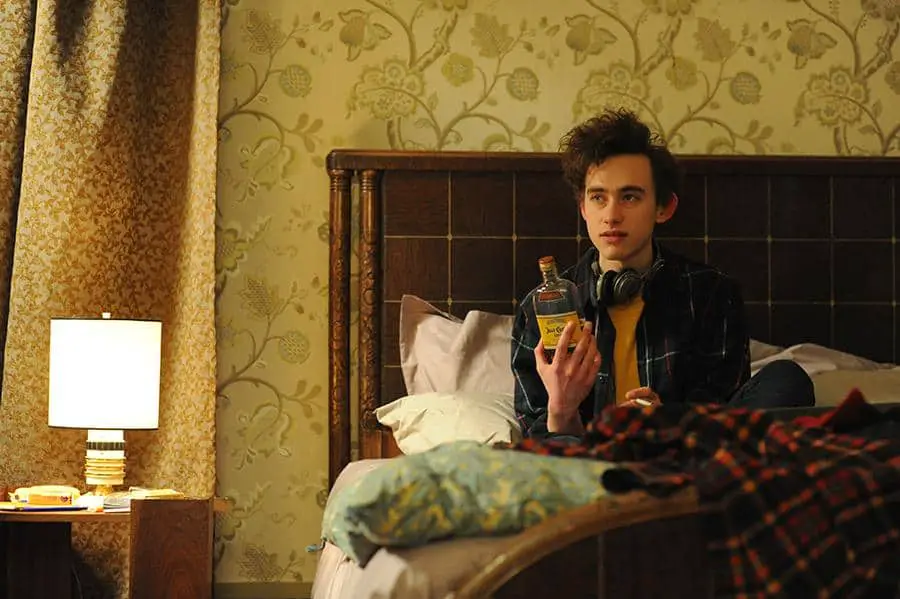
Here a completely off-screen character has a function: Morgan’s first wife (the son’s mother) has been so depressed she jumped out of a window. With the symbolism of the balcony, and the earlier dread that Nick has perhaps ‘left’ Meg (jumped off it?) it is clear to both Nick and to the audience that things could be much, much worse.
In parallel, Meg talks to Morgan’s young, new wife — appropriately pregnant — she is full of the joys of first love. The much older Morgan has already confided in Nick that she can’t see through him yet, though it won’t last. The starry-eyed love of the young pregnant woman who would love to spend all day every day with her husband stands in stark contrast to the worn-out exhaustion of Meg, whose husband can’t stand to be alone and is terrified that no one wants to spend time with him. (Another drip-fed psychological shortcoming.)
This way, Nick becomes an increasingly flawed character and Meg becomes more relatable.
BIG STRUGGLE SEQUENCE IN LE WEEK-END
Apart from verbal sparring there are some minor physical tousles. I’ve noticed in fiction, unless it’s meant to be heavy, it’s more acceptable for a wife to cause harm to the husband than the other way around. The reasons for this are obvious. Women tend to do less damage when they do hit — with less physical strength the threat is lesser and the mood can remain light. This film would have felt quite different had the husband pushed the wife onto the road, hurting her knee and, later, slammed her into a wall.
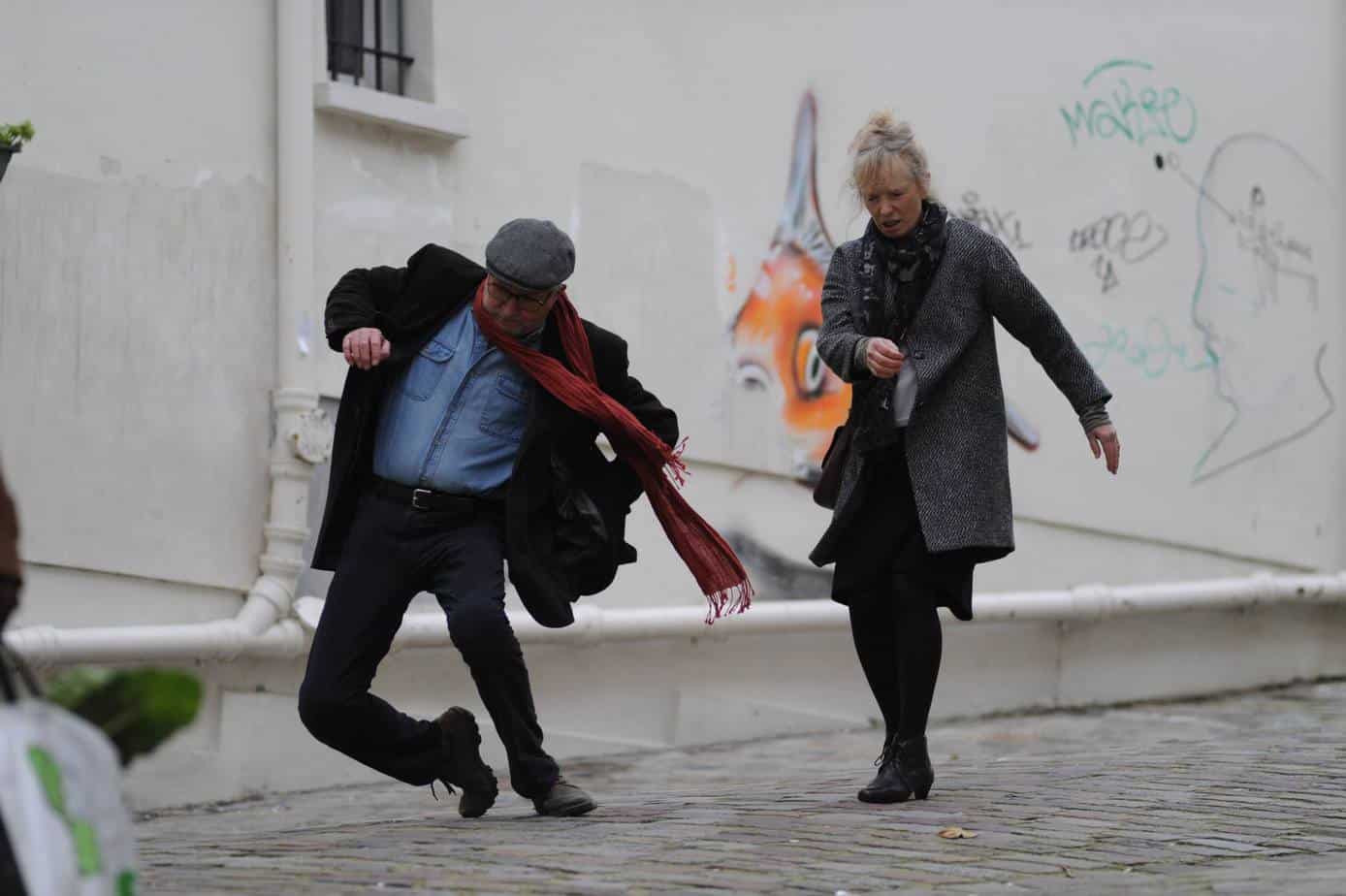
In children’s films, too, violence is linked with love (just so long as the comic violence originates from the female character). I have posited some reasons behind why we’ll accept this.
ANAGNORISIS IN LE WEEK-END
In myth stories, it’s not simply a ‘self’ revelation — it is a public revelation. The hero discovers that s/he is not just a regular person but also a king/superhero/great leader. This is a metaphor for a character realising s/he has to take responsibility for not just him/herself but for the community, as a leader. Sometimes these stories include a ‘cosmic’ revelation, which is where a hero gets a vision about how an entire society should act in the future: Moses on the mountain top, Jesus on the mount.
What is the ultimate big struggle — the big struggle all the others have been leading up to? I suggest it is the dinner party spectacle, in which Nick is expected to make an impromptu speech and instead ends up using a table full of eminent strangers as an audience for his turmoil. Perhaps it’s fitting that this takes place at the American’s house — this seems to be a particularly American thing to do in fiction. In Big Love we have Nicolette making a neighbourhood speech from the rooftop — there are many other examples of humiliations being all the worse for taking place in front of a crowd of people. This is one trick writers use to tell the audience, “there were arguments before, but this is the BIG one.” Until recently I felt this was an American phenomenon rather than a British one.
NEW SITUATION IN LE WEEK-END
The audience watches as Meg and Nick wait for Morgan in the coffee shop. Significantly, Meg is now wearing Nick’s hat, which she sort of stole from the porters who are clearing out their room. With Meg wearing an item of her husband’s clothing, the individuals of this couple have reunited.
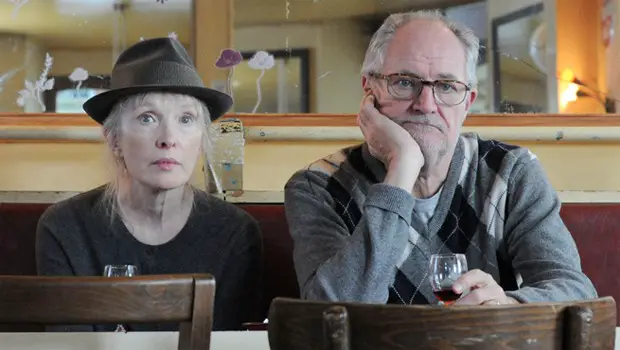
This part of the story is only hinted at. A musical rom-com often ends with a dance of some kind — here we have a trio who have lost their inhibitions — partly because they are abroad and partly because they are now of an age where they can start caring less about what other people think.
